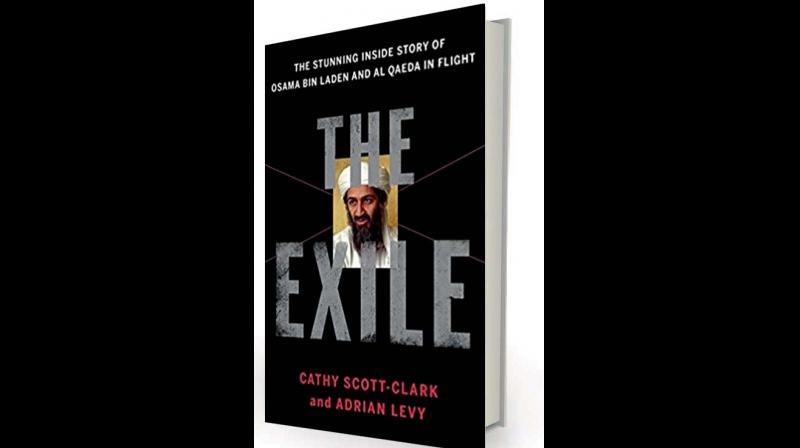Book Review 'The Exile: The Stunning Inside Story of Osama bin Laden and Al Qaeda'

The Exile is a sledgehammer of a book: it’s a thriller, a historical record, a masterpiece of investigative journalism and above all a captivating inside story of this century’s greatest villain, the Al Qaeda.
Two British journalists, Cathy Scott-Clark and Adrian Levy, chart the hurried flight of the world’s most notorious terrorist Osama bin Laden from the interiors of Afghanistan to the Tora Bora caves and eventually to Abbottabad in Pakistan.
The book, they stress, is no official history but an account painfully reconstructed from interviews with persons affiliated or related to Osama bin Laden, officials and some members of his vast extended family. The result, the authors claim, is a book that tells “the story of Al Qaeda from the inside”.
The bulk of the action is centred in Pakistan, where Osama bin Laden and his family arrived from Afghanistan following the US invasion of 2001. Iran too plays a part with the Islamist regime trying to use Al Qaeda to its advantage.
The narrative’s accounts of the machinations inside Pakistan, the workings of the ISI and the complexities of relations between Islamabad and Washington make for fascinating reading. The pace is relentless as Al Qaeda agents secure themselves in Pakistan and fend off conflicting national and internal interests.
The book puts together little-known details such as the manner in which Abu Faraj al-Libi, Al Qaeda’s number three, had chosen Osama bin Laden’s final hideout in Bilal Town, Abbottabad, and directed the “Kuwaiti” brothers Ibrahim and Abrar to buy the land and build a safehouse.
The brothers not only built the house and its 18-feet high boundary wall but also installed anti-snooping devices and other precautions. “A disguised Osama bin Laden and his family arrived in Abbottabad at the end of August [2015], settling on the second floor”, while the Kuwaitis “lived downstairs in a self-contained apartment cut off from the rest of the house by a locked metal gate”.
Some six years later a US SEAL team would break into the house to shoot dead Osama bin Laden and call their mission commander in Washington with the now famous phrase: “For God and country, I pass Geronimo, Geronimo EKIA”. Enemy killed in action.
The two authors are no stranger to Pakistan or its powerful Army establishment. Levy worked in Pakistan as a correspondent for many years and used his experience to write Deception (also co-authored with Scott-Clark), another blockbuster of a book revealing how Pakistan stealthily built the bomb with the tacit compliance of Washington.
The two have built a reputation for being hard-nosed investigative journalists penetrating areas where few would dare to tread. Apart from Pakistan, they have written on Kashmir terrorism and the 26/11 Mumbai attack. Scott-Clark, a freelance journalist, writer and documentary filmmaker, has reported from Bosnia, Rwanda, Serbia, Afghanistan, Iran among other countries.
But the hunt for Osama bin Laden’s trail from his base in Afghanistan to his exodus to Pakistan and ultimate assassination at Abbottabad must have been the duo’s hardest hunt yet.
Where the book disappoints, at least to those Indians who are aware that Pakistan’s military is elbow deep in the global terrorism cauldron, is its whitewashing of the generals in Rawalpindi. The authors conclude that the top generals did not know anything about Osama bin Laden hiding in Abbottabad and were as astonished as the rest of the world when he was discovered and killed.
This is as hard to believe as is the assertion that the whereabouts of Osama bin Laden was only known to the late jihadi general Hamid Gul, and a so-called S section of the ISI, which believe it or not, supposedly works independently of both the ISI and the Pakistan Army. Come on!
It’s the little things like this that jar. The preface too seems a little contrived, the authors arguing that theirs’ is the real version of Osama bin Laden’s exile while the versions put out by the US government in particular about his life and ignominious end are nothing but pernicious propaganda.
The authors portray themselves as rebels against an authoritarian system that manipulates public opinion and twists facts.
“While falsehoods were advanced, behind the scenes the Pentagon and White House aggressively pursued those who broke real stories…All of which made it more essential than ever to get behind the history that was being told”, they write.
So here is essentially an alternative view of history. Which one are we to believe? The common reader is left adrift, not having access to the mass of documents, untold stories, secret files and what have you. History is ultimately what we make of the past.
Despite its flaws, the book must be highly recommended; it is a gripping narrative of our times and all the darkness hidden in the nooks and crannies of our complex world, and despite its bulk and excruciating details the authors have dug up, the books ends up as a bloody good read.

